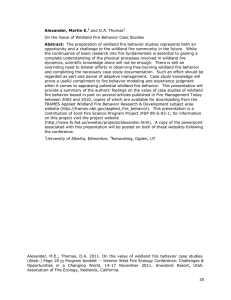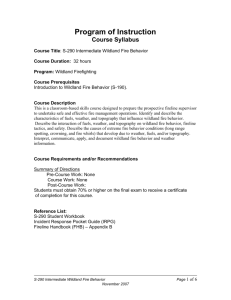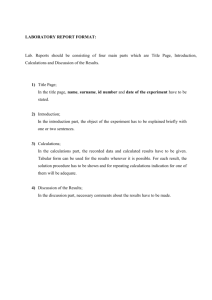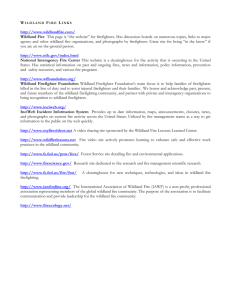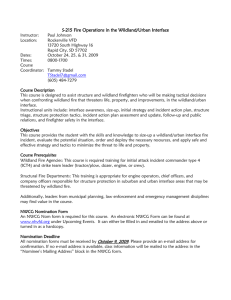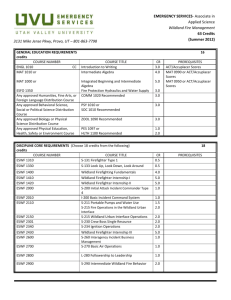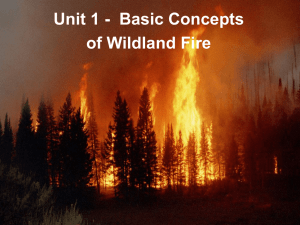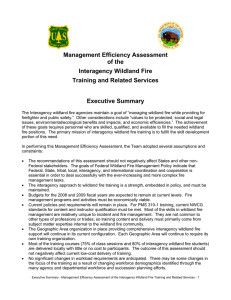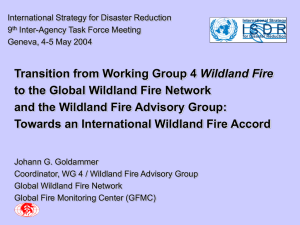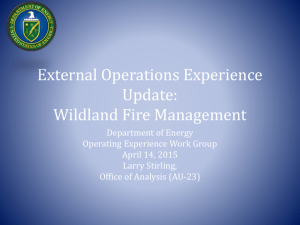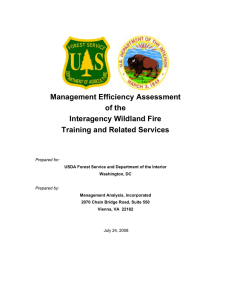Syllabus - S
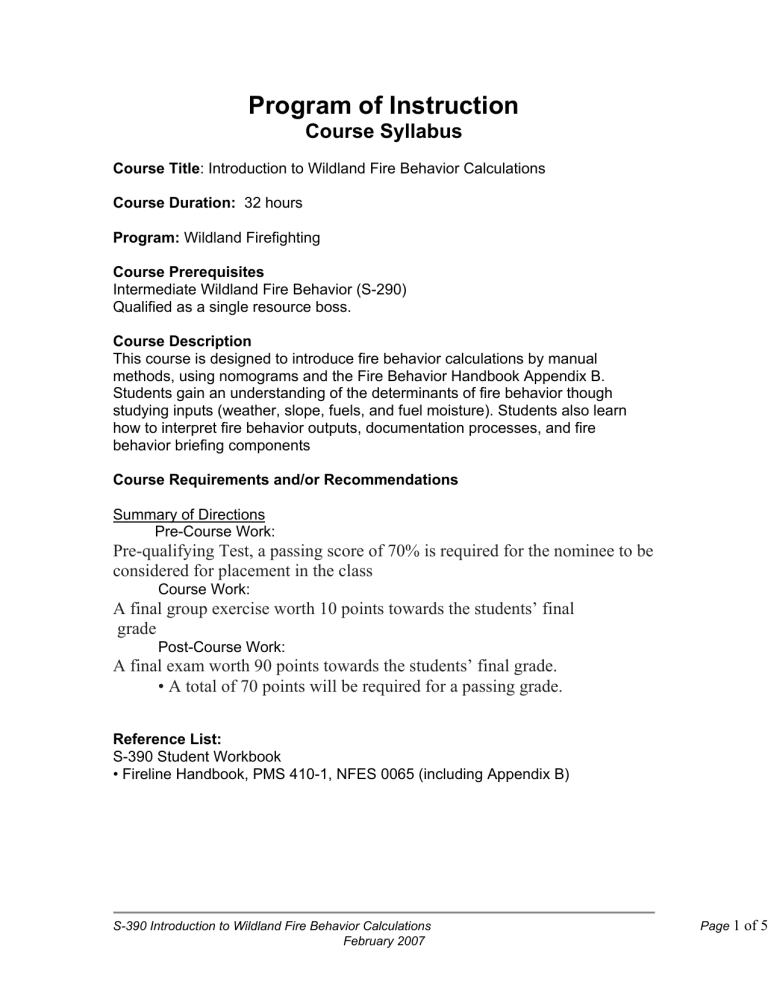
Program of Instruction
Course Syllabus
Course Title : Introduction to Wildland Fire Behavior Calculations
Course Duration: 32 hours
Program: Wildland Firefighting
Course Prerequisites
Intermediate Wildland Fire Behavior (S-290)
Qualified as a single resource boss.
Course Description
This course is designed to introduce fire behavior calculations by manual methods, using nomograms and the Fire Behavior Handbook Appendix B.
Students gain an understanding of the determinants of fire behavior though studying inputs (weather, slope, fuels, and fuel moisture). Students also learn how to interpret fire behavior outputs, documentation processes, and fire behavior briefing components
Course Requirements and/or Recommendations
Summary of Directions
Pre-Course Work:
Pre-qualifying Test, a passing score of 70% is required for the nominee to be considered for placement in the class
Course Work:
A final group exercise worth 10 points towards the students’ final
grade
Post-Course Work:
A final exam worth 90 points towards the students’ final grade.
• A total of 70 points will be required for a passing grade.
Reference List:
S-390 Student Workbook
• Fireline Handbook, PMS 410-1, NFES 0065 (including Appendix B)
S-390 Introduction to Wildland Fire Behavior Calculations
February 2007
Page 1 of 5
Course Policies:
Attendance Policy: IFSI requires students to attend (100%) or make up all course content that leads to certification. Students are expected to attend on time and to remain in class for the duration of the course. Students MUST
COMPLETE all portions of a certification course, both classroom and practical, to be eligible to receive their certification.
If a student misses any portion of class with an accumulated absence of 20% or less of scheduled class time, it will be the student’s responsibility to arrange the make-up of the missed course content with the instructor(s) or program manager.
The student must make up the specific course content that s/he missed, not just the hours. Make-ups are limited to 20% of scheduled class time. Make-ups must be documented on the class roster. If a student’s absence is greater than 20% refer to “True Emergences” section of the IFSI Examination Policy.
Safety Policy: Students shall understand and follow all instructions pertaining to operational safety, as stated by instructors or as written in course materials.
Instructors and students shall be mindful of safety at all times. Conduct judged to be unsafe shall be grounds for dismissal from the course.
Academic Integrity Policy: IFSI has the responsibility for maintaining academic integrity so as to protect the quality of the education provided through its courses, and to protect those who depend upon our integrity. It is the responsibility of the student to refrain from infractions of academic integrity, from conduct that may lead to suspicion of such infractions, and from conduct that aids others in such infractions. Any violation of the code of conduct is grounds for immediate dismissal from the course.
Grading Policy: Decisions regarding certificates of course completion shall be made solely by the lead instructor of the course. All grading of exams shall be conducted by the Curriculum/Testing Office. All grading of practical exercises shall be based upon the standards set by the regulatory agency referenced in the course material and IFSI.
American Disabilities Act: As guaranteed in the Vocational Rehabilitation Act and in the American Disabilities Act, if any student needs special accommodations they are to notify their instructor and provide documentation as soon as possible so arrangements can be made to provide for the student’s needs. If arrangements cannot be made at the class site, the student will test at an alternative time and place where the special accommodations can be made.
Evaluation Strategy: Example : Students will be evaluated with an end of course exam, and performance evaluation checklist.
S-390 Introduction to Wildland Fire Behavior Calculations
February 2007
Page 2 of 5
Course Content:
Unit 0: Introduction
Unit 1: Topography
Unit 2A: Atmospheric Stability
Unit 2B: Winds
Unit 2C: Weather Information and Forecasts
Unit 3: USFBPS Fuel Models
Unit 4: Fuel Moisture
Unit 5A: Non-Electronic Wildland Fire Behavior Processors
Unit 5B: Spotting Model
Unit 5C: Safety Zone Calculations
Unit 6A: Plotting Fire Size and Shape
Unit 6B: Point Source
Unit 7: Extreme Fire Behavior
Unit 8: Documentation, Briefings, and Monitoring for Fireline Safety
Unit 9: Final Group Exercise
Final Exam
S-390 Introduction to Wildland Fire Behavior Calculations
February 2007
Page 3 of 5
Course Schedule
DAY ONE
Event Duration
Unit 0 – Introduction 1 hour
Unit 1 – Topography 1 hour
Unit 2A– Atmospheric Stability 2 hours
Lunch
Unit 2B – Winds 2 hours
Unit 2C - Weather Information and Forecasts 2 hours
DAY TWO
Event Duration
Unit 3 – USFBPS Fuel Models 4 hours
Unit 4 - Fuel Moisture
Lunch
2 hours
Unit 5A - Non-Electronic Wildland Fire Behavior Processors 3 hours
S-390 Introduction to Wildland Fire Behavior Calculations
February 2007
Page 4 of 5
DAY THREE
Event Duration
Unit 5B - continued 2 hours
Unit 5B - Spotting Model 2 hours
Lunch
Unit 5C - Safety Zone Calculations 1 hour
Unit 6A - Plotting Fire Size and Shape 3 hours
DAY FOUR
Event Duration
Unit 6B - Point Source 2 hours
Unit 7 - Extreme Fire Behavior 2 hours
Lunch
Unit 8 - Documentation, Briefings, and Monitoring Fireline Safety ½ hour
Unit 9 - Final Group Exercise 1 ½ hours
Final Exam 2 hours
S-390 Introduction to Wildland Fire Behavior Calculations
February 2007
Page 5 of 5
